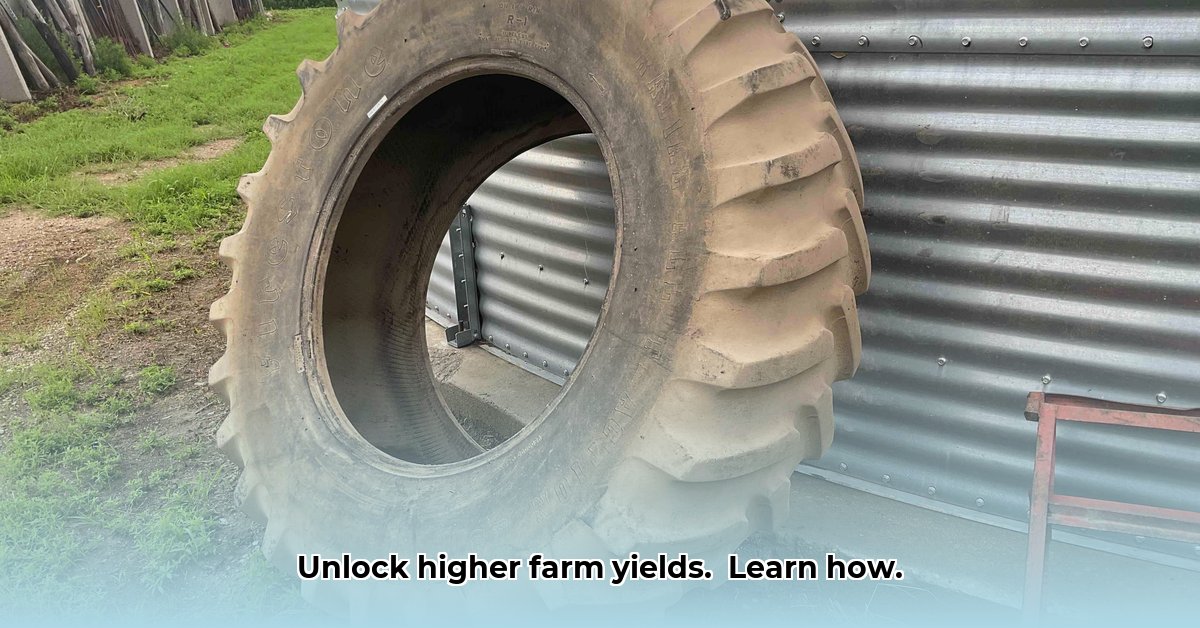
Understanding the Role of 20.8R38 Tractor Tires in Sustainable Agriculture
The agricultural sector faces increasing pressure to enhance productivity while minimizing environmental impact. Sustainable farming practices are crucial, and tire selection plays a surprisingly significant role. Specifically, the 20.8R38 tractor tire, with its large footprint and advanced designs, offers several advantages in promoting soil health and operational efficiency. This guide explores how choosing the right tires, coupled with mindful farming techniques, can lead to significant gains in both yield and sustainability. For more on tire maintenance, see our guide on tire maintenance.
Decoding Tire Specifications: What Does 20.8R38 Mean?
The designation "20.8R38" provides crucial information about the tire's dimensions and construction. The "20.8" indicates the tire's width in inches, highlighting its substantial size. The "R" signifies a radial tire construction, known for its strength and durability. Finally, "38" represents the tire's diameter in inches. This combination signifies a large, robust tire designed for high-capacity tractors and heavy implements. How does this translate to farm efficiency?
The Impact of Tire Size and Design on Soil Health and Fuel Efficiency
The wide footprint of a 20.8R38 tire distributes the tractor's weight more evenly across the ground, significantly reducing soil compaction. Soil compaction reduces water infiltration and nutrient uptake, directly impacting crop yields. By minimizing compaction, these tires contribute to healthier soil and improved crop growth. Furthermore, the larger contact area translates to better traction, reducing tire slippage. This, in turn, leads to improved fuel efficiency, lowering operating costs and reducing the farm's carbon footprint. Isn't reducing fuel costs an important aspect of sustainable farming?
Beyond Size: Key Factors in Tire Selection
While the 20.8R38 size offers significant benefits, several other factors must be considered for optimal performance and longevity:
Load Capacity: The tire's load capacity must match or exceed the combined weight of the tractor and its implements to prevent overloading and premature wear.
Ply Rating: This signifies the tire's strength and durability. Higher ply ratings offer greater resistance to punctures and damage, enhancing tire lifespan.
Tread Pattern: The tread pattern's design is tailored to specific soil conditions. Deep, aggressive treads are ideal for muddy fields, providing maximum grip, while shallower treads are better suited for firmer ground, promoting fuel efficiency.
Regular tire maintenance, including frequent pressure checks and monitoring of tread depth, is essential for maximizing tire life and preventing damage. Consistent inflation is critical; under-inflation increases wear and reduces efficiency, while over-inflation can damage the tire structure.
Sustainable Farming: Optimizing Tire Performance
Sustainable farming prioritizes resource efficiency and environmental protection. The 20.8R38 tire directly contributes to these goals:
Reduced Soil Compaction: The large contact area minimizes soil disturbance, improving water infiltration and root growth.
Improved Fuel Economy: Lower fuel consumption reduces operational costs and greenhouse gas emissions.
Enhanced Crop Yields: Healthier soil translates to improved crop growth and higher yields.
Responsible tire disposal at the end of their lifespan is another critical aspect of sustainability. Several tire manufacturers offer recycling programs, reducing waste and minimizing environmental impact.
Future Innovations in Agricultural Tires
Tire technology continues to evolve, focusing on developing more sustainable solutions. Innovations include the use of bio-based materials, such as sustainable rubbers, and advanced manufacturing techniques to create longer-lasting, more environmentally friendly tires. Research into tire designs that further minimize soil compaction and improve fuel efficiency further enhances the sustainability of agricultural operations.
Actionable Steps for Sustainable Farming with 20.8R38 Tires
Implementing these steps can boost your farm's sustainability and profitability:
Assess your needs: Carefully analyze your soil conditions, typical loads, and farming practices to determine the appropriate tire size and specifications.
Choose appropriately: Select tires with sufficient load capacity, a suitable ply rating, and a tread pattern optimized for your soil type. Consider IF (Improved Flexion) or VF (Very High Flexion) tires for enhanced performance.
Implement proper maintenance: Regularly check tire pressure and monitor tread depth to ensure optimal operation and longevity.
Explore CTIS (Central Tire Inflation System): CTIS enables dynamic pressure adjustment, optimizing tire performance for various field conditions. This can provide considerable efficiency gains.
Consider long-term investments: While initial costs might be higher for advanced tire technology, the long-term benefits, including fuel savings and increased yields, often outweigh the initial expense.
By making informed tire choices and implementing effective maintenance practices, farmers can create considerably more sustainable and productive farming operations. It's an investment in a healthier planet and a more profitable future.